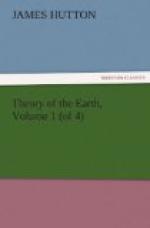There may, indeed, be some difficulty in conceiving all the modifications of this mineral power; but as, on the one hand, we are not arbitrarily to assume an agent, for the purpose of explaining events, or certain appearances which are not understood; so, on the other, we must not refuse to admit the action of a known power, when this is properly suggested in the appearances of things; and, though we may not understand all the modifications, or the whole capacity and regulation of this power in bodies, we are not to neglect the appropriating to it, as a cause, those effects which are natural to it, and which, so far as we know, cannot belong to any other. On all occasions, we are to judge from what we know; and, we are only to avoid concluding from our suppositions, in cases where evidence or real information is necessarily required. The subject now considered, subterraneous fire, will afford an example of that truth; and, a general view of this great natural power will here find a proper place, before the application of it for the explanation of natural appearances.
No event is more the object of our notice, or more interesting as a subject for our study, than is the burning of a fire: But, the more that philosophers have studied this subject, the more they seem to differ as to the manner in which that conspicuous event is to be explained. Therefore, being so ignorant with regard to that fire of which we see the origin as well as the more immediate effects, how cautious should we be in judging the nature of subterraneous fire from the burning of bodies, a subject which we so little understand.
But, though the cause of fire in general, or the operations of that power in its extreme degrees, be for us a subject involved in much obscurity, this is not the case with regard to the more common effects of heat; and, tho’ the actual existence of subterraneous fire, as the cause of light and heat, might be a thing altogether problematical in our opinion; yet, as to other effects, there are some of these from which the action of that liquefying power may be certainly concluded as having taken place within the mineral region, although the cause should be in every other respect a thing to us unknown. In that case, where the operation or effect is evident, and cannot be disputed, to refuse to admit the power in question, merely because we had not seen it act, or because we know not every rule which it may observe in acting, would be only to found an argument upon our ignorance; it would be to misunderstand the nature of investigating physical truths, which must proceed by reasoning from effect to cause.
Our knowledge is extremely limited with regard to the effects of heat in bodies, while acting under different conditions, and in various degrees. But though our knowledge in these respects is limited, our judgment with regard to the efficacy of this power of heat is in its nature positive, and contains not any thing that is doubtful or uncertain. All mankind, who have the opportunity, know that the hard substance of ice is by heat converted into water, wherein no hardness remains; and the profound philosophy of Dr Black, in relation to the subject of latent heat, as that of Sir Isaac Newton, in relation to the weight of bodies, is not necessary to convince the world that in the one case ice will melt, and in the other, that heavy bodies will move when unsupported.




